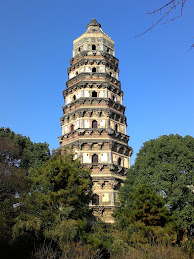大容玩過電腦麻將、象棋麻將,知道他的陳阿姨會打真正的麻將,於是在打球之餘偶爾也會過來家裡砌砌長城。今天端午,他跟著我和陳阿姨到阿祖家過端午,喜孜孜地捧著沉甸甸的麻將牌,希望在那裡能夠跟長輩湊足四人,打打方城之戰。
果然,他的三姑婆三姑爺都是老麻將,他的阿公也是深藏不露,於是這隻初生之犢,也就不畏虎地在三位老年人面前碰 (掽)、吃、聽 (挺)、胡 (和),不亦樂乎。我和陳阿姨,只有作壁上觀的份。
根據資料顯示,麻將於 1920 年代初被引進歐美,造成一股風潮,某些術語也被音譯為英語,為《牛津英語詞典》(The Oxford English Dictionary) 所收,如 "麻將" (mah-jong)、"碰" (pung)、"胡" (woo)。事實上,mah-jong 亦可名詞轉動詞,意為 "胡",與 woo 同義。
《牛津英語詞典》給 woo 的詞源標註為 "來源不詳" (Origin unknown)。事實上,根據我上海籍太太的說法,上海話的 "胡" 就是讀 woo。因此,《牛津英語詞典》下次修訂時不妨將這個 "Origin unknown" 的詞源改成 "Chinese (Shanghainese)"。
pung (pʌŋ) v., n., and int. Mah Jong.
[Chinese.]
A. v. intr. To take a discarded tile in order to complete a triplet of identical tiles. Also trans. B. n. A set of three identical tiles; also, the action of the verb. C. int. The call made by the player performing this action. So punging vbl. n.
1922 R. E. Lindsell Ma-Cheuk or Mah-Jongg 12 A useless domino..is placed face upwards in the middle of the table, and can at once be claimed by any of the other three players who has already a pair or threes of that particular domino. This is called 'parking' or 'punging'.
1923 J. P. Babcock Rules for Mah-Jongg (ed. 2) ii. 15 Should a tile be discarded and any player have a pair (or three) of this same tile, even though out of his own turn, he may 'Pung', that is he says 'Pung' and takes this discarded tile, placing it with the pair (or three) from his own hand face up in front of him on the table... A Pung which completes a hand takes precedence over any other Pung.
1925 B. Travers Mischief v. 86 Louise came in, all fatigued and heated from harbouring red dragons and punging her opponent's wind.
1934 Neuphilologische Mitteilungen XXXV. 132 Mah-jongg..pung 'set of‥three identical tiles'.
1960 R. C. Bell Board & Table Games vi. 155 If any of the other three players holds two tiles identical with one just discarded, he may call 'Pung!' and take it out of the pool. Only the last discarded piece may be punged.
1964 E. N. Whitney Mah Jong Handbk. I. iii. 28 If you have a pair in your hand and any player discards an identical tile, you may declare 'pung' and claim the discarded tile instead of drawing from the wall. Ibid. 169 Pung, claiming a discard that completes a triplet. After punging, the player must meld his completed triplet.
woo (wuː) v.
[Origin unknown.]
= mah jong v.
1922 H. Sterling Standard Rules & Instr. Chinese Game Mah Chang (ed. 4) 6 Experienced players invariably prefer to 'Woo' quickly with a small score rather than fail to 'Woo' at all. Ibid. 12 The Woo hand adds 2 points if he Woo with only one possible piece..or if he hold one of his last pair and Woo with the other.
1943 K. S. Whitehead Mah Jong Chinese Way §59 A player whose hand contains a false set has a 'foul hand', and cannot woo.
1973 J. Scarne Scarne's Encycl. Games xxiii. 451 When he completes his hand, four sets and a pair, a player may woo or mah-jongg by showing his whole hand. He wins the deal, ending play.
mah jong, mah-jong (mɑː ˈdʒɒŋ)
Also mah jongg, mah jongh, etc., and as one word.
[Chinese ma-ch'iao (Shanghai dial. -tsiang) sparrows (f. ma hemp + tsiang small birds), the name of the game.]
(noun sense and quotations omitted here)
v. intr.
to complete one's hand at the game of mah jong.
1923 J. Bray How to play Mah Jong 12 Each player in turn draws a tile and discards one in place of this until some player completes his hand; i.e. 'Mah Jongs'. Ibid. 21 None of the following tiles in the hand assist so far in Mah Jonging (completing the hand)..and may be discarded.
1924 M. C. Work Mah-Jongg Up-to-Date i. 32 The Chinese word 'Woo' (meaning peace) has been extensively used by many American writers in the same sense as it is used by Chinese players; viz., to Mah-Jongg, to win the game, to go out.
1933 E. Talbot Mah-Jong made Easy 31 Sometimes a player collects tiles that will give a small mah-jong to oneself and discards those of high value that give another player the opportunity of making a big hand, even if he does not mah-jong.
1966 'Han Suyin' Mortal Flower i. 24 Everyone..shopping, tea-ing, mahjonging or donkey-riding.


2 comments:
廣東話的胡音也是woo。
日本人也打麻將,他們稱之為麻雀,供打麻將的場所稱雀莊,職業打手稱雀士。廣東人也會把打麻將稱為打麻雀,專供打麻將的場所稱為雀局,廣東人很愛打麻將,老一派的辦喜宴會設雀局,讓早到的來客有點娛樂不空等。
感謝路人閣下賜教。
根據《牛津英語詞典》的說法,"麻將" 的英文 mah-jong 源自上海話,是 "麻雀" 音變而來。因此我猜想打麻將的相關術語或許也源自上海話,便本能地跟上海太太求證。
想不到廣東話 "胡" 的發音也類似 woo,謝謝你增廣我們的見聞。
Post a Comment